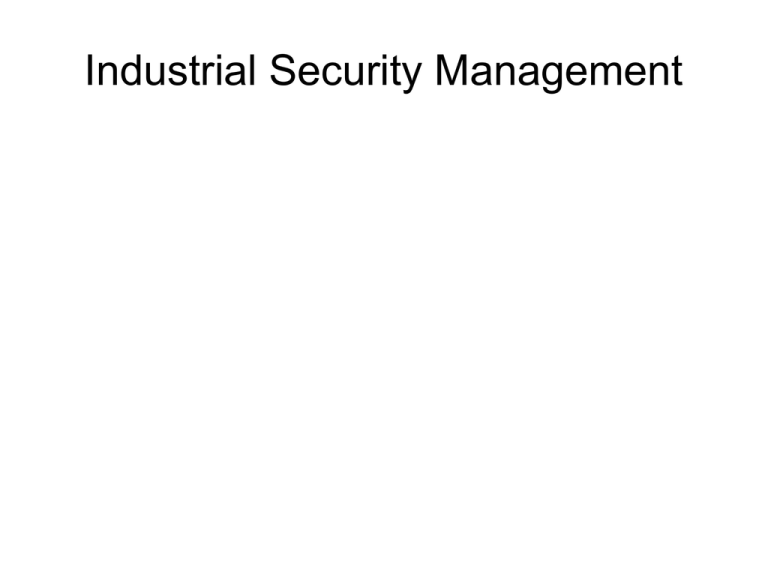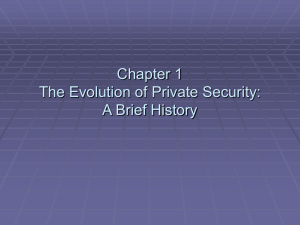introductory notes security
advertisement

Industrial Security Management Define Security 1. Freedom from risk or danger; safety. 2. Freedom from doubt, anxiety, or fear; confidence. 3. Something that gives or assures safety, as: a. A group or department of private guards: Call building security if a visitor acts suspicious. b. Measures adopted by a government to prevent espionage, sabotage, or attack. c. Measures adopted, as by a business or homeowner, to prevent a crime such as burglary or assault: Security was lax at the firm's smaller plant. d. Measures adopted to prevent escape: Security in the prison is very tight. Ancient Times Lake dwellings Drawbridges and boats Natural caves on high cliffs Great wall of China Emperor Shih Huang Ti Rome Broad, straight roads Patrol by legions Bridges, controlled by iron gates and guards Emperor Augustus Emperor Augustus Recognized unreliable legions Praetorian Guard Urban cohorts Bodyguard police Gendarmerie composed of soldiers with police and military duties Vigiles police-firemen Middle Ages Nobleman Serfs Provide food and security for the serf who works the land, and provide arms for the king and fought his wars Laborer Tithings Groups of 10 families who maintain law and order Anglo-Saxon, acceptance of mutual responsibility for civil and military protection of individuals Frankpledge System of Social Obligation King demanded all Englishmen to swear to maintain the peace Magna Carta King John Document that established the supremacy of law over arbitrary edict Established the lord's individual rights Stated the responsibilities of the state and its subject Statute of Westminster King Edwards 1285 Formalized England's practice in criminal justice and apprehensions Involvement of ordinary citizens in criminal justice Requires every male between ages 15-60 to keep a weapon in his home as a “harness to keep the peace” Preventive aspect Watch and ward Repressive aspect Hue and cry Watch by night, ward by day Upon resistance—citizen's assistance Punitive aspect Presentment to constable Morning after the arrest Cromwell 1655 Tried to use army as police force to prevent and repress crimes Lack of cooperation from all classes of people Absence of effective police mechanism between the people and his troops Early Themes in Security Management Division of area into geographic sections Rotation of duties among citizens Early Problems of Security Management Dissatisfaction of citizen's with their duties Hiring of others to take their place Industrial Revolution Mechanization of production system Change from cottage industries to large factories Famine in rural ares—movement of people from country to towns to seek work in factories Increase in political extremists “Riot Act”- military quell the riots Rewards and Punishment Reward law-abiding citizens Severe punishments to discourage lawbreaking Self-help organization—every man to trust himself for security 19th Century England Security as a private enterprise Industrial firms employ their own police Railway companies “Bow Street Runners” Alternative to private thief-takers Reward system Bribery Criminal collusion Sir Robert Peel 1829 Established the Metropolitan Police Force in London, England Based at Scotland Yard Constables were nicknamed “bobbies” or “peelers” "the police are the public, and the public are the police" Mid-1800s at the United States American colonists—English System of law enforcement Collective responsibility Reformation of Manners Society of the Suppression of Vice and Encouragement of Religion, 1801 “Evangelical Police” system Violence in the West Stagecoach Mail, gold, money passengers Prey for hold-ups James Gang and Wild Bunch 1848, discovery of gold Express companies 1850, American Express Henry Wells and William Fargo East of Missouri 1852, west of Missouri Alan Pinkerton 1880s Modern day private security 'master sleuth” Civil War Intelligence and counter-espionage services Between 1867 and 1875 led the pursuit for Frank and Jessie James Personal guard for President Abraham Lincoln Pinkerton Detective Agency “We never sleep.” Black and white eye (private eye) After Alan Pinkerton's death in 1884, the agency was ran by his sons Robert Pinkerton and William Pinkerton Considered as the only investigative agency with truly national capabilities Philippine Setting Pre-War March 1, 1943 Special Watchman Agency Later renamed Jimenez Security Agency First formally licensed private security agency Granted license by the City of Manila pursuant to an ordinance passed by the City Council no. 2162 Post-War “Bombay Serene” Security guard Porter Messenger No obligations to employers Watchman Deterrence by their physical presence Early Security Agency Business name Mayor's permit Municipal licenses Book of account (BIR, Bureau of Internal Revenue) Lax supervision and administration by government Firearms are uncontrolled in terms of number, distribution, caliber and type Total permissiveness PADPAO Philippine Association of Detectives and Protective Agency Operators, Inc. May 30, 1958 Private security agency operators Code of conduct and a system of control Lobbied in congress RA 5487 Private Security Agency Law June 13, 1969 Set standards and minimum requirements for operation of private security agencies Specifically tasked the Commanding General, Philippine Constabulary (CG, PC) with general supervision over private security service industry in the country Problems Inefficient small, fly-by-night operators Armed groups posing as security agencies Too-large agencies—private armies PD No. 11 October 3, 1972 President Ferdinand E. Marcos Rectify problems of RA 5487 Enlarge coverage of “Private Security Law” Include security guards and watchmen employed by logging concessions, agricultural mining or pasture land and under the category of watchmen Security guard agency includes not only government-owned but also controlled corporations that employ their own security guards Increase regulatory power of CG, PC now Chief, PNP that authorizes to impose sanctions which is inclusive of authority to suspend violators of provisions of RA 5487 Did not resolve the problems of private security service industry from the viewpoint of law enforcement PD No. 100 January 17, 1973 Broaden the coverage of industry Include employee of the national or local government, or any agency, or instrumentality thereof, that is employed to watch or secure government buildings, compounds or premises and other properties other than members of the Armed Forces of the Philippines (AFP), guards of the National Bureau of Prisons (NBP), provincial and city guards, and members of the police forces of the cities and municipalities









